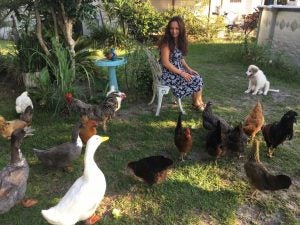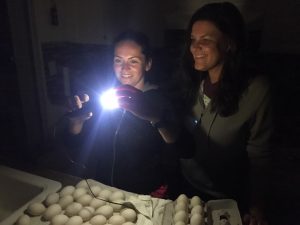Natalia Derevianko wasn’t always an American farmer. The Ukrainian native came to the U.S. when she was only 12 years old and had to learn the culture and language from scratch.
She’s a friend whom I met in Chicago about 12 years ago when we both lived there in our 20s. Both big-city girls with “corporate America” style office jobs, we laugh now about how we’ve both become rural farmers. Life manages to take its twists and turns, but ultimately we’ve found ourselves “living the dream” while she started her farm from nothing with her husband.
I took an opportunity to really talk with her about agriculture, which includes some advice on how to start your own small farm.
Michelle Miller: Why did you want to be a farmer?
Natalia Derevianko: I didn’t really know I wanted to be a farmer. I grew up on a farm in Europe, I when had the opportunity to make a life change, I went back to those roots. It’s something that came naturally to me.
MM: How did you get started?
ND: It started when I was far away from the land. When I lived in a city townhouse, the association wouldn’t allow us to grow our own food, and I was frustrated they kept ripping up my plants. Later I bought land and was really excited about having agricultural property and returning to how I grew up. I started with a big garden, a roadside stand, and a few chickens and ducks. I learned a lot from my plant-science-professor husband and from reading books, watching videos. I did a lot of research.
MM: What were some of your biggest learning curves?
ND: When I moved to Florida, I was facing different challenges and had to learn to grow crops all over again. New soil type, unpredictable weather, the pressure from disease and insects is high here. To learn more, I talked to UF [University of Florida Gainesville] extension a lot and went to some UF training courses. They have the “Vegetable Production Handbook,” the farmers’ bible. It helps you figure out what varieties to grow and how to treat them. It’s really a neat tool.
MM: What are the other challenges you’ve had?
ND: Talking to people at the farmers markets. You get a lot of silly questions. Do you spray Roundup on your plants? Are these seeds GMOs? Time is always my biggest challenge. I do a lot by myself. You think you can manage it all, but it’s tricky to get the right volume of everything. It’s good to take it slow and plan ahead. Those are part of my mistakes. I jump into everything at once. Within a year, we had four greenhouses, a one- to two-acre garden, three orchards, two hydroponics systems, over 100 birds. That’s rushing it when you’re doing it by yourself.

MM: Has it been expensive to get started?
ND: $45,000 to $50,000 get started on drip irrigation, chicken coupe and barn building materials. Greenhouse plastic is expensive. Down here you need a lot of fertilizers, feed costs add up very quickly. Had to get tractors, mowers, fruit trees, expand the flock, etc.
MM: Are you profitable yet?
ND: The first two years were a loss. This will be my third year, and it’s very important for me to finally turn a profit. Otherwise I can’t afford to do it anymore. As the fruit trees come into production the projections suggest I’ll be doing well.
MM: What makes your farm different or unique?
ND: For me it was important because at the farmers market you have to have something exotic to be unique; I grow kei apple, Che fruit, pitangatuba, etc. In other words, find things no one’s heard of and grow that. I want to be different and provide things you can’t find in the store. Heritage breed chickens with multi colored eggs, goose eggs, duck eggs. Things like that. [Note: The name of Natalia’s farm is Eggsotics for this reason! Follow her here.] I also am a one-woman operation, maybe with an occasional helper. I plant the seed, care for the plant, and sell it at the market.

MM: Has it been a successful strategy?
ND: People are very excited to try new things at the market. It’s kind of what people go to the markets for. Plus customers want to meet the producer, and I’m it. And since I never want to be big enough to sell to grocery stores, the farmers market is my best option.
MM: If you had any advice you could give to someone just starting out, what would it be?
ND: Go slow. Don’t jump into everything at once. Planning ahead is key. I’m very good at accessing the situation to prepare for the next season and to and have very few predator issues. It comes with good management and planning.
MM: Where do you see yourself in five years when it comes to the farm?
ND: In five years, everything will be more automated and manageable. My rule of not planting anything before irrigation is an important one to stick with. In five years, everything is supposed to get better. Plus I learn so much from every season.
MM: Any final thoughts?
ND: It is a lot of work, but it’s how I grew up. I grew up watching my grandma. The work is harder than you expect it to be though. The more you expand, the harder it is. And when you’re just starting off, it’s harder to find help. I think it’s where I belong. If you really love doing it, you’ll stick with it. No matter how much I complain about it, I’ll still do it. It’s my livelihood. It takes a strong-willed person but the outcome is highly rewarding. Even with all of the hard work and challenges it is worth it, especially when customers come back because they love the products.
Michelle Miller, the Farm Babe, is an Iowa-based farmer, public speaker, and writer, who lives and works with her boyfriend on their farm, which consists of row crops, beef cattle, and sheep. She believes education is key in bridging the gap between farmers and consumers.



